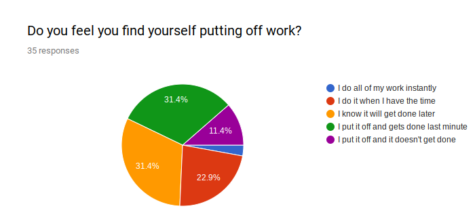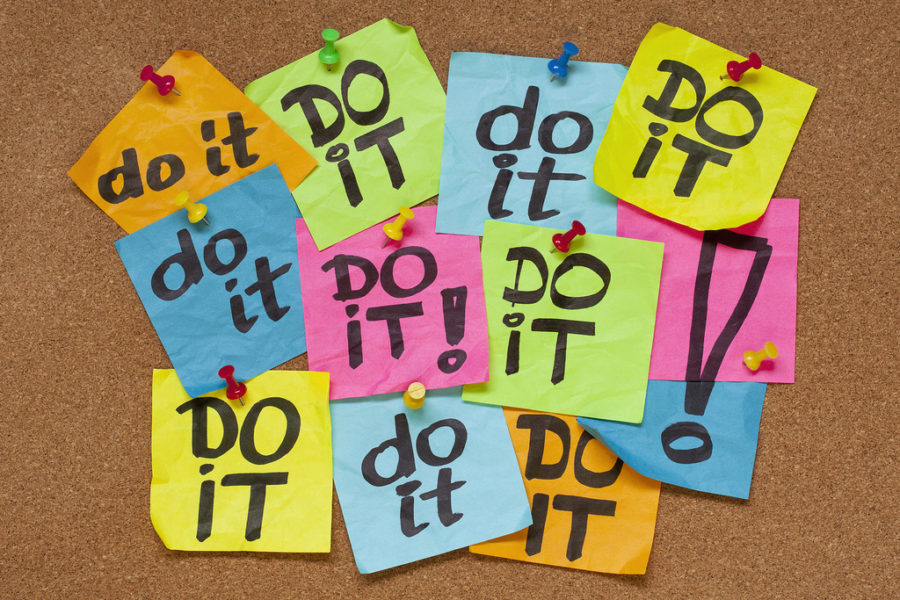The art of procrastinating
January 17, 2019
It’s Sunday night. You’re sitting at your desk staring at the blank piece of paper and hoping that your essay will magically write itself. You haven’t actually read the book but have read some
summaries of it. You’re about to start working, but you stop and you tell yourself, “I’ll wake up early tomorrow and do it then.” That’s procrastination.
When you wake up the next morning, you get dressed, eat breakfast, and get ready to go to school, but in that moment you remember that you still have to write that essay, and now it won’t get done.
This is one of those #relatable moments that happens to the best of us. The definition of procrastinating “is the action of delaying or postponing something.” Sure, we might all do this once in a while, and some chronic procrastinators underestimate the time it will take to get work done.
Around 20% of people define themselves as chronic procrastinators and for them it’s a lifestyle and they like it. They usually don’t pay bills on time, leave work until the last minute and they leave all their christmas shopping till Christmas eve which is terrible for the gift receiver.
There are also health risks that come with procrastinating. Over the course of one college ter m, procrastinatory students had more colds, flu, gastrointestinal problems, and insomnia.
m, procrastinatory students had more colds, flu, gastrointestinal problems, and insomnia.
People frown upon procrastinators especially since your teacher expects your best on all of the work you do. If you put everything to the last minute, the finish product will be lower quality than if you put more time and energy into it.
Procrastinators might feel that they need an excuse to make themselves feel better about why they put off work so they might say that they were born a procrastinator. But that is actually not true procrastinators are made not born.
There are also many different types of procrastinators such as thrill-seekers people who enjoy having to rush, Avoiders who fear failure or even success and Decision procrastinators people who can’t make decisions for themselves which leads to not having control of outcomes.
In addition it has costs to others by shifting work responsibility to others who might already have a heavy workload and they will start to resent you for it. Procrastination can destroy friendship, teamwork and get you in trouble. Julian Goodger said, “I sometimes find that I have to do all of the work in a group because they forgot or didn’t do it.”
This may all seem gloomy and depressing but there is an upside, there are many ways to deal with procrastination. A couple ways include forgiving yourself for procrastinating in the past. Studies have shown that forgiving yourself has a positive outcome and will Lower your chance of future procrastination.
Promise yourself a reward, when you complete a task on time reward yourself with a treat like sweets or nice food. While you enjoy the spoils of your task try to notice how good it tastes and how nice it is to finish things.
Try to finish the harder and less enjoyable work first so that way it gets gradually easier to get work done. You can also minimize distractions by disconnecting yourself from social media and sit in a place with minimal distractions.
Ask someone to pressure you. We have been told that peer pressure is a terrible thing that gets people to do bad things but in this case it actually works. And in the possibility that you have no friends and are lonely you can use the Procraster app.
In his book “The Procrastination Cure” Jeffrey Combs says trying 15-Minute bursts of work productivity. He also says to start with smaller tasks because the small wins will make the workload seem less and make you feel more positive.
While we may think of procrastination as a modern thing due to technology making us lazier than ever before.
Freshmen Joshua Eliot said, “Technology gives us the ability to remove ourselves from the situations were in.” But in fact it actually has been a common problem throughout history.
Procrastination probably came to be when not completing work didn’t mean certain death but it also could have been when the first board games were played (Senet, 3100 BC).
Freshmen Harrison Reinisch commented, “I know if I tried to distract myself with games then the procrastination would get really bad really fast.”
But who really knows for sure when procrastinating came to be it all could have started when the first task was ever assigned and that person didn’t want to do it or said they would do it later. But we do know that it is a problem that affects many of us. We need to try and help those who do procrastinate because that’s just being a good samaritan.
Also even though they procrastinate doesn’t mean you don’t get affected by it to by helping them out you will also be helping yourself as well. And if you do procrastinate try to use some of the steps in this to improve yourself.


